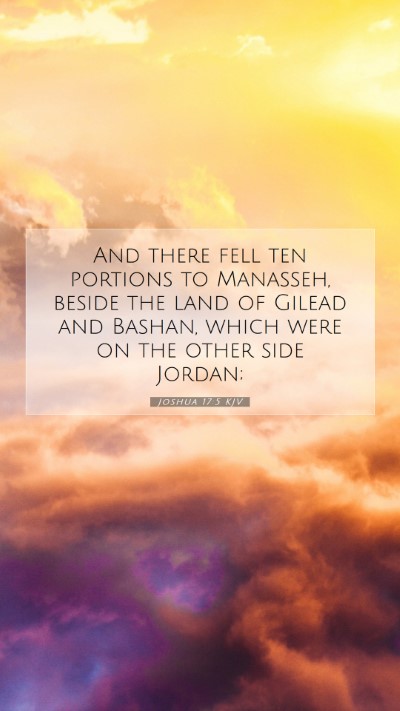Old Testament
Genesis Exodus Leviticus Numbers Deuteronomy Joshua Judges Ruth 1 Samuel 2 Samuel 1 Kings 2 Kings 1 Chronicles 2 Chronicles Ezra Nehemiah Esther Job Psalms Proverbs Ecclesiastes Song of Solomon Isaiah Jeremiah Lamentations Ezekiel Daniel Hosea Joel Amos Obadiah Jonah Micah Nahum Habakkuk Zephaniah Haggai Zechariah MalachiJoshua 17:5 Meaning
What is the meaning of Joshua 17:5?
And there fell ten portions to Manasseh, beside the land of Gilead and Bashan, which were on the other side Jordan;
Joshua 17:5 Bible Verse Meaning
Understanding Joshua 17:5
Joshua 17:5 states, "And there fell ten portions to Manasseh, beside the land of Gilead and the Great Sea westward." This verse serves as a crucial juncture in the allotment of lands to the tribes of Israel under Joshua's leadership, specifically addressing the tribes of Manasseh. Through this scripture, we find rich insights into the theme of inheritance and legacy within the Biblical narrative.
Bible Verse Meanings
This passage reveals the significance of divine promise manifested through land inheritance. The land distribution is a reflection of God's faithfulness to His covenant with the Israelites. As noted in various Bible verse commentaries, particularly in those by Matthew Henry, the mention of "ten portions" indicates the multitude of families and clans within Manasseh and signifies the blessings bestowed upon them.
Insights from Public Domain Commentaries
-
Matthew Henry:
Henry emphasizes that this allocation highlights God's providence. The division of land illustrates how the Lord ensures each tribe receives what they require, both materially and spiritually. This concept resonates with the overarching Biblical theme of stewardship and reliance on God's provision.
-
Albert Barnes:
Barnes elaborates on the geographical significance of the land. He explains that the Great Sea (Mediterranean Sea) is pivotal in understanding the socio-economic context of the tribes linked to commerce and sustenance. The land's richness would thus support the tribe’s growth and influence.
-
Adam Clarke:
Clarke points out the importance of unity among the tribes, as the detailed mention of land divisions fosters a sense of identity and belonging. This sense of unity is essential for communal worship and obedience to God's laws as indicated throughout scripture.
Historical Context and Relevance
Analyzing the historical context of this verse is crucial for understanding Scripture as a whole. After years of wandering in the desert, the Israelites finally reach their Promised Land, which signifies God's promise kept. The land is not merely a place but symbolizes rest, fulfillment, and God’s guidance throughout their trials.
Application of the Verse in Daily Life
For contemporary readers, the message found in Joshua 17:5 relates to understanding one's inheritance—both spiritual and physical. As believers, we are often encouraged to reflect on our personal legacies and the lands we navigate in life. Like the tribe of Manasseh, we must acknowledge God's provisions in our lives and the responsibility that comes with it.
Cross References
- Numbers 26:29-34: Discusses the lineage and significance of the tribe of Manasseh.
- Joshua 14:4: Addresses the division of the land among the tribes, setting a precedent for this verse.
- Deuteronomy 3:12-17: Mentions the land that was allocated to the tribes of Reuben, Gad, and half of Manasseh, giving more depth to the inheritance.
Conclusion
In summary, Joshua 17:5 is not just a logistical verse outlining land distribution but is rich with theology and intent, encapsulating God's fidelity to His people. Through a careful study and application of this text, one can glean deeper importance regarding the concept of inheritance in God's family. This verse encourages us to be mindful of what we inherit and how that shapes both our identity and our responsibilities in faith.
Bible Study Resources
For those interested in further exploration, using Bible study tools and engaging in online Bible study groups can enrich understanding. Bible study lessons focused on land inheritances in the Old Testament can enhance our grasp of these themes. Consider resources that provide in-depth Bible verse analysis to foster a deeper appreciation of passages like Joshua 17:5.


